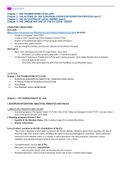9/11 OVERVIEW
Chapter 1: THE FOUNDATIONS OF EU LAW
Chapter 2: THE ACTORS OF THE EUROPEAN UNION’S INTEGRATION PROCESS (who?)
Chapter 3: THE EU SYSTEM OF LEGAL NORMS (how?)
Chapter 4: THE UNIQUE NATURE OF THE EU LEGAL ORDER
LITERATURE SUGGESTIONS
Start with:
(https://eur-lex.europa.eu/collection/eu-law/treaties/treaties-force.html, for free!)
• Treaty on European Union (TEU)
• Treaty on the Functioning of the European Union (TFEU)
• Charter of Fundamental rights of the European Union (Charter)
• tip: print them, paper version!
• you can bring the treaties and charters (found on the link) to the exam
Also look at:
• Muir, Elise. Introduction to the EU Legal Order. Acco, 2021
• the book is an useful second explanation => but not verplicht
• 14 document analyses on Toledo (part of the exam, because exam: more advanced document analysis)
o exercise before the course
o only those who participate benefits from the feedback als participation laag is
OVERVIEW
Chapter 1 THE FOUNDATIONS OF EU LAW
I. EUROPEAN INTEGRATION: OBJECTIVES, PRINCIPLES AND VALUES
II. A UNIQUE FORM OF REGIONAL INTEGRATION
III. EVOLUTION
IV. THE PRIMARY LEGAL FRAMEWORK
Chapter 1. THE FOUNDATIONS OF EU LAW
I. EUROPEAN INTEGRATION: OBJECTIVES, PRINCIPLES AND VALUES
I. OBJECTIVES, PRINCIPLES AND VALUES
• Essential purpose of European Union (‘EU’) Art.1 §2 of the Treaty on European Union (‘TEU’): ‘an ever closer
union among the peoples of Europe’
2 founding principles (Article 4 TEU)
1. Equality of the Member States. (Nb: includes respect for national identities)
2. Sincere cooperation
A set of values: common to the MS + foundations of the EU:
• ‘The Union is founded on the values of respect for human dignity, freedom, democracy, equality, the rule of
law and respect for human rights, including the rights of persons belonging to minorities. These values are
common to the Member States in a society in which pluralism, non-discrimination, tolerance, justice,
solidarity and equality between women and men prevail.’ (Art. 2 TEU)
• ‘Complementary’ source: Art. 6 TEU
• Necessary presumption: ‘mutual trust’
o once you join the EU-club, we assume we can trust you
• Renewed attention: risks of serious breaches of the rule of law in Poland and Hungary
, II. A UNIQUE FORM OF INTEGRATION
II. A UNIQUE FORM OF REGIONAL INTEGRATION (but not the only form)
Forms of economic EU = a broader political
integration: project:
• free trade area
•fundamental status of EU
• ‘customs union’
citizen
• ‘internal market’
•common economic and
monetary policy
Internal market - an area
without internal frontiers in •an area of freedom, security
which the free movement of and justice
persons, services and •a common foreign and security
capital is ensured policy
and goods
• free tradeCourse
Compare: area =byfirst level
prof. of economic integration (free movement of goods and services without a fee
J. Wouters
related to crossing the border)
• customs union (douaneunie)
• EU is much more than economic integration, much more than an internal market
• an area with free movement without any border control (outside exceptional circumstances like terrorists,
medical reasons)
II. A UNIQUE FORM OF INTEGRATION: among others in Europe
Regional organizations:
• EFTA (European Free Trade Association)
• Iceland, Liechtenstein, Norway, The Swiss Confederation
• advanced free trade area
• European Economic Area (‘EEA’)
• EU + Iceland, Liechtenstein and Norway (no ordinary partners of the EU, but affected by what the EU
does!)
• Close relationship with Norway and the Swiss Confederation
• Swiss Confederation isn’t part of the EEA or EU, but they have many bilateral treaties with
the EU
• Norway in particular
• advanced form of economic integration between
II. A UNIQUE FORM OF INTEGRATION: tools
- ‘intergovernmental’ method
- way of making international law
- governments come together to make international
agreements, they have to be signed and ratified
- ‘supranational’ method/‘community’ method
- operates with supranational institutions that are independent from the individual wheels (power)
from the individual states
- ‘integration through law’ – e. g. the centrality of the Treaties on the European Union, in the process of
European integration
- => compare: course by prof J. Wouters




